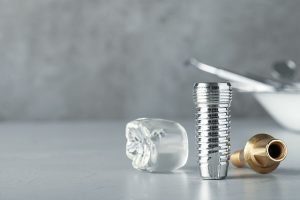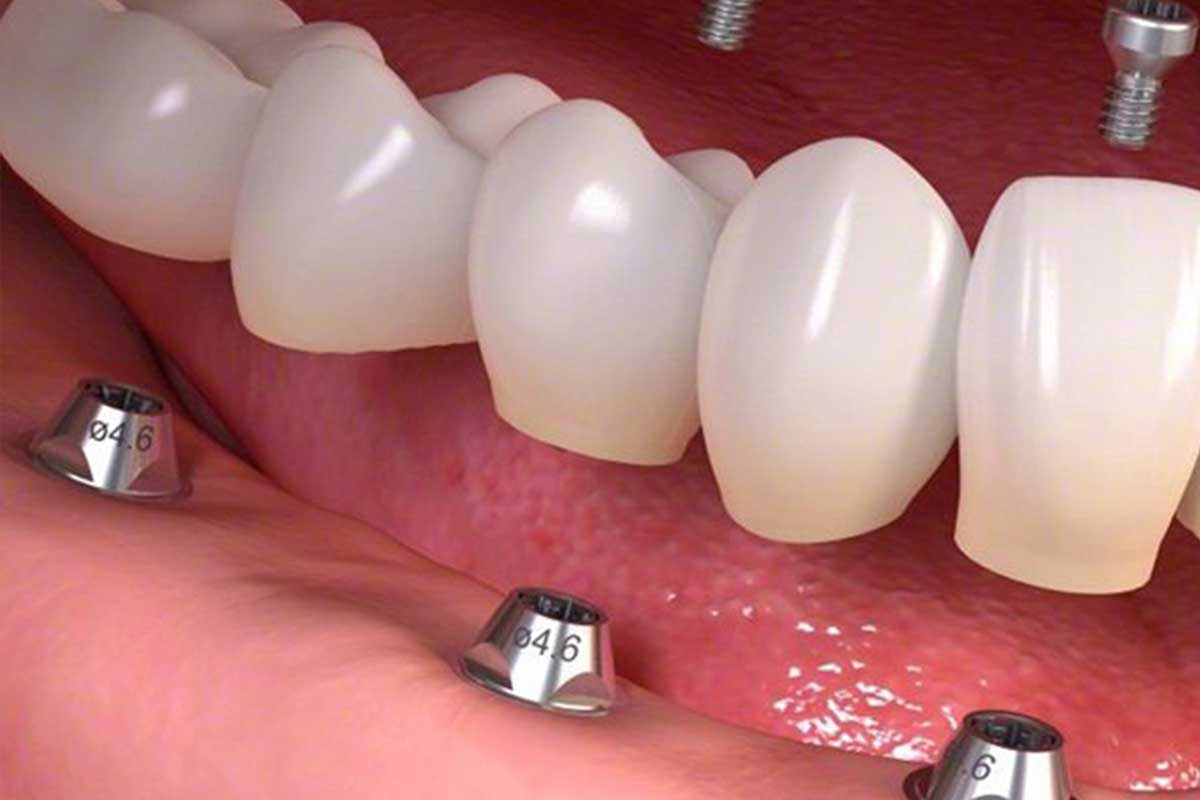Implant dental treatment is one of the most suitable methods to replace your missing teeth and to have your cracked, damaged or unhealthy teeth treated. Thanks to the dental implant, you can have healthy mouth and teeth. Implant teeth can perform the same functions as your natural teeth. They do not cause you any trouble during biting, chewing or other jaw movements.
You can replace your teeth that you had to have or will have to be extracted for any reason with Implant dental treatment. Implant teeth may face gingival disorders like natural teeth. Therefore, you need to take care of your implant teeth.
Implant Dental Care
Implant dental care should begin with the placement of dental prostheses at the root of the tooth. After the end of the implant treatment, bleeding may occur in the gums of the patients at first. Tampons can be made to prevent these bleedings. Nothing should be consumed within the first 2 hours after implant treatment. During the first 48 – 72 hours, consuming extremely hot or extremely cold foods should be avoided. If swelling occurs in the gums after the treatment, the swelling can be reduced with ice therapy.
As with natural teeth, dental implants can cause plaque and bacteria formation or inflammations. For this reason, the person who has an implant tooth should take care of your oral and dental hygiene a little more and take care of it correctly. While performing your implant dental care, you should take care to use dental floss and mouthwash as well as brushing your teeth. Using an electronic toothbrush can help you more than other toothbrushes to clean your mouth and teeth. Because the vibrations created by the electronic toothbrush better clean the plaque formed by food particles under the gum line.
While performing oral and dental hygiene, you can completely clean the food particles that have escaped between the gums and teeth by using dental floss in the area where the implant tooth is attached. You can gargle with a salt water mixture. In this way, you can literally clean the acid and bacteria left on your teeth. You should stay away from applications and care products that will corrode your teeth and damage your teeth with acidic substances, just because you will fully perform your hygiene. Otherwise, you may damage the implant tooth.
Implant teeth can also turn yellow and stain like natural teeth over time. Therefore, you should avoid excessive consumption of coffee, tea, cigarettes and alcohol. In addition, while performing your oral and dental hygiene, you should not damage the implant tooth root, which is made of titanium, which absorbs sweat under the gums. For this reason, you should avoid hard moves and excessive pressure while brushing or flossing your teeth.
Melting may occur in the jawbone holding the implant tooth, and after these meltdowns, the implant teeth and natural teeth may fall out. For implant dental care, you can regularly go to specialist dentists for control. By going to the dentists, you can have both your natural teeth and your implant teeth cleaned and find out if they are healthy.
 Implant care is an issue that should be focused on sensitively after tooth transplantation. Implants are artificial carrier tooth roots that are attached to the jawbone instead of the tooth root. After the implant process is completed, the patient wants a tooth in the type and model that he/she likes to be mounted on the implant. This veneer can be a porcelain or zirconium type product.
Implant care is an issue that should be focused on sensitively after tooth transplantation. Implants are artificial carrier tooth roots that are attached to the jawbone instead of the tooth root. After the implant process is completed, the patient wants a tooth in the type and model that he/she likes to be mounted on the implant. This veneer can be a porcelain or zirconium type product.
The implant offers great advantages to the patient in many ways. It is a fact that the lack of teeth poses great problems both in terms of aesthetics and health. Inability to perform eating and drinking activities without any problems, gingival sagging, deterioration of the rows of other teeth, shifting, problems arising from prostheses placed instead of implants, deterioration of face and smile aesthetics (especially in the absence of anterior teeth), heart and digestive problems, jaw bone meltdown, It causes many problems such as speech disorders.
After implant dental treatment, implant care is an issue that should be emphasized with precision. In the rest of our article, we have touched on some important issues related to post-implant oral care that we think may be useful for you.
Oral Care After Implant
- The tampons placed on the implanted area should be bitten for one hour in such a way that they do not loosen moderately. If bleeding does not continue after one hour, it can be discarded. If bleeding continues, a new clean tampon is bitten for another half hour. If bleeding still continues, tampon application should continue until the bleeding stops. There may be some leakage from the surgical site in the first 4-6 hours after the operation. In cases where the bleeding continues for a longer time, you should consult your doctor.
- Do not eat or drink anything for 2 hours after the implant application. In the first 48-72 hours, you should stay away from hot foods and drinks. Soft and room temperature foods (such as soup, yoghurt, pudding, bread crumbs) are suitable. Acidic fruit juices, alcoholic beverages and spicy foods should be avoided. If the patient has diabetes, he should continue to eat carefully and regularly in accordance with the recommendations of his doctor.
- You should not smoke for 4-5 days following the implant surgery. Smoking should not be avoided after surgery, as it will irritate the wound area, jeopardize healing and increase the temperature in the mouth. In patients who smoke excessively, it is difficult to close the sutures in the wound area. This can also lead to inflammation.
- Edema (swelling) is observed at the end of oral surgery. It’s normal. This edema can be alleviated with an ice pack applied on the operation area intermittently on the first day (applying 5-10 minutes and resting for 10-15 minutes). Continuous use of the ice pack can cause ice burns. Therefore, ice application should be applied at intervals as described above. At the end of the first 72 hours, edema or swelling will begin to decrease gradually. Take care to use the painkillers recommended by your dentist for a certain period of time.
- Avoid blowing movements that will stretch your cheek to protect your stitches. Do not touch your finger or tongue to the seams. If any of your stitches come off within the first 5 days, it would be beneficial to check with your dentist again. If necessary, your dentist may suture again.
- Follow your dentist’s prescription for post-operative recovery. Aspirin or similar drugs that increase bleeding (salicylic acid derivative) should not be taken. The most severe pain is in the first 6 hours when the effect of local anesthesia wears off. However, if your pain is so severe that you cannot bear it, you should consult your doctor.
- You can apply normal brushing procedures to the non-operated areas. Brush the teeth in the operation area without touching the sutures and gums. Approximately two days after the operation, gargle with the mouthwash recommended by your dentist, after brushing your teeth twice a day in the morning and evening.
- At the end of the period recommended by your doctor (7-10 days), have your stitches removed. Your doctor will make an appointment and follow up with you depending on your oral and healing speed. Be sure to attend your appointments.
Long-term care recommendations after implant surgery:
If you want to use your new teeth efficiently for many years after your implant treatment is completed, you should be very careful about implant care. Just like your natural teeth and gums, a meticulous protection process is required for implant care. For a long-lasting implant use, it will be sufficient to pay attention to the following short tips.
- An over-implant prosthesis is made on each implant. This prosthesis can be a single dental crown or bridge prosthesis, or it can be a fixed or removable prosthesis on the implant. Food residues accumulating around the implant can lead to implant disease called implantitis, just like gum disease. For this reason, the part where the implant and the gingiva meet, the spaces between the implant and the neighboring teeth should be cleaned carefully. For this, you should use dental floss and an interface brush in addition to a regular toothbrush. Your dentist will show you how to use it.
2.Do not forget to clean your tongue and palate as well as your teeth. Bacteria living on the tongue and palate can damage the teeth and gums. In addition, using a mouthwash will help a lot in removing bacteria from the mouth.
- Do not neglect your dental calculus and tartar cleaning. You can have it cleaned every 6 months or once a year, depending on your oral condition.
- Sometimes, although it is thought that everything seems to be normal, there may be melting in the bone around the implant. In order to detect this early, it is useful to shoot a panoramic film once a year and then once every two years. These main 4 items are very important for implant care in the long term.
What Kind of Path Is Followed in Implant Treatment?
Before starting the implant treatment, a specialist doctor examination is performed in the first place. In this examination, a detailed scan is performed as a result of the jaw bone structure, bone density and films taken. The implant is made with a titanium component that fuses best with human bone. If the patient does not have sufficient bone ratio, bone formation is performed for his jaw by means of graft side bone powder. If our patient has sufficient bone ratio, the implant process can be started immediately. After the patient and doctor have discussed all the necessary details and the brand to be used for the implant procedure, it is time to take the measurement. Implant dimensions are determined according to the patient’s oral and film results.
After the implants are prepared, the implant socket is opened on the patient’s jawbone under local anesthesia and the necessary screwing process begins. The implant attached to the jawbone fuses well with the bone in about 6 weeks. The patient can easily have the desired product and feature tooth placed on the implant. After all implant procedures are completed, all the patient has to do is hygienic implant care.

